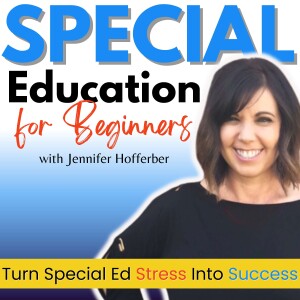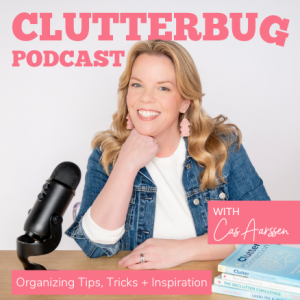

Special Education for Beginners | Managing Paraprofessionals, Special Education Strategies, First Year Sped Teachers, Special Ed Overwhelm, Paperwork for Special Education Teachers
https://feeds.buzzsprout.com/938566.rssEpisode List

How Movement Impacts Behavior: OT Insights for the Classroom
This month on the Special Education for Beginners podcast, we’ve been focused on behavior—what causes it, how to prevent escalation, and how to respond when it happens. But today, we’re flipping the script and talking about what it looks like when things are going well.In this episode, I’m joined by Marga Grey, a pediatric occupational therapist and founder of CoordiKids, to discuss what true self-regulation looks like in the classroom and how educators can support it through movement, sensory-friendly strategies, and brain-based practices.If you’ve ever wondered:"Is wobble seating really effective?""What does regulation actually look like?""How can I build a classroom that supports ALL students—especially those with sensory needs?"Then this episode is for you!🧠 What You’ll Learn in This Episode:What a regulated child really looks like (hint: it’s not always about being calm or quiet)How movement affects focus, behavior, and learningWhy some trendy strategies (like exercise balls) work for some students—but not allThe connection between posture, rhythm, and emotional controlPractical ways to build a sensory-friendly classroom that meets individual needs📘 Resources Mentioned:💻 CoordiKids Home Course 1 – FREE for listeners ➤ Use coupon code: homecoursepod A ready-to-use series of brain-based movement videos designed for students to develop self-regulation and motor skills at home or in small group instruction.🔗 Connect with Marga and CoordiKids:Website: https://www.coordikids.comInstagram: @coordikids🎧 Tune in and Share! If this episode gave you a new perspective or practical ideas to try in your own classroom, please share it with a fellow educator and leave a review on Apple Podcasts or Spotify—it helps more teachers find the show!📌 Don’t forget to subscribe so you never miss an episode!Sign up to be notified each time a new episode airs and get access to all the discounts!Don't forget to leave a review of the show!Follow JenniferInstagramTPT

What to Do (and NOT Do) When a Student Escalates
📅 September Behavior Series – Week 3Hey there, and welcome back to the Special Education for Beginners podcast! This is the third episode in our September series all about behavior—because if you’ve worked in special education for more than a week, you know behavior is part of the job. But how we respond makes all the difference.In this episode, I walk you through what to do (and what not to do) when a student is escalating. Whether it’s shouting, shutting down, crying, pacing, or full-blown meltdowns—you’ll leave this episode with clear, actionable strategies to stay calm, respond wisely, and preserve your relationship with the student.🔥 You'll Learn:What escalation really looks like (and why it’s not always loud)5 things NOT to do during a behavior spike (that we often do anyway!)7 regulation-based strategies that help bring students back downWhy your calm matters more than the perfect responseThe importance of teaching regulation before you need itAnd why behavior is always communication💡 Don’t forget: Even the best strategies fail if we don’t model and teach them during calm moments. 🎧 Mentioned in This Episode:✅ Episode 226 – 7 Proactive Strategies to Prevent Behaviors Before They Start✅ Episode 227 – How the Brain Impacts Behavior with Guest Sam Parmalee🛠️ Featured Resource: Sometimes students don’t know how to express how they’re feeling—or even what they’re feeling. This Manage My Mood tool helps students reflect on their strengths, triggers, and emotions, while giving you insight to support them proactively. The resource includes:Strengths & triggers checklistReflection formsGraphing toolsBlank & colored Feelings Thermometers🚨 Limited Time Offer: This product is 50% off right now! Grab it while it’s marked down!📢 Let’s Connect If you found this episode helpful, share it with a fellow educator or leave a review on your favorite podcast platform—it helps so much!📬 Join my newsletter for more tools, strategies, and special offers: https://www.spedprepacademy.com/podcast Sign up to be notified each time a new episode airs and get access to all the discounts!Don't forget to leave a review of the show!Follow JenniferInstagramTPT

How the Brain Impacts Behavior & What You Can Do About It
Welcome back to our month-long focus on behavior management in the special education classroom.In this episode, we’re digging into the science behind student behavior with special guest Sam Parmelee. This isn’t your typical conversation about clip charts and consequences. We’re talking about regulation, relationships, and the real reasons behind challenging behavior.We know that classroom behavior can be one of the most overwhelming parts of a special education teacher’s job, and often the one we feel least prepared for. That’s why this episode focuses on brain-based regulation and a powerful framework that helps educators respond to behavior with clarity, compassion, and confidence.Sam shares what every educator should know about the amygdala, the prefrontal cortex, and how our brains process stress, threats, and relationships. We also explore why so many behavior plans fail (hint: it’s not just about the students) and why emotional regulation is just as important for adults as it is for kids.💡 What You’ll Learn in This Episode:Why understanding brain function is essential to supporting behaviorWhy we need to stop asking dysregulated students to “think about their choices”How to regulate yourself first, especially in heated momentsPractical tools for improving staff buy-in to behavior plansThe CALM technique Sam uses to guide de-escalationThe difference between responding to behavior vs. reacting to it🔧 Strategies You Can Use Tomorrow:Use the phrase “This behavior is happening in front of me, not to me” to help emotionally detach in the moment.Teach your team the CALM acronym: Connect, Affirm, Listen, My Plan.Normalize the idea that behavior interventions, like academics, require collaboration, data, and adaptability.Provide staff with the tools they need to implement plans—think timers, visuals, checklists.Host team discussions that change the narrative around student behavior from “defiance” to “a skill that hasn’t been taught yet.”📘 Article Mentioned: Sam’s article on Emotional De-escalation (Edutopia): Read it here📱 Follow Sam on Social Media @theedqueen on instagram, facebook & tik tok! The ED Queen Website🧠 Resource Mentioned:125 Behavior StrategiesSign up to be notified each time a new episode airs and get access to all the discounts!Don't forget to leave a review of the show!Follow JenniferInstagramTPT

7 Strategies to Prevent Behaviors Proactively
Welcome back to Special Education for Beginners! September is such a critical month for teachers. It’s the time when routines are still being built and the habits you create now will either set you up for a calm, structured classroom or leave you constantly putting out “fires” all year long.In this episode, we’re talking about prevention...how to stop behaviors before they start. Of course, we know there’s no way to erase every single behavior, but wouldn’t it be nice to reduce the frequency, intensity, and unpredictability of those behaviors with just a few proactive systems?I’ll walk you through 7 practical strategies that special educators can start using right away to create smoother routines, reduce disruptions, and build a more positive, predictable environment for students. These strategies include:Setting clear, explicit expectations (and teaching them like academics)Using predictable routines to create a sense of safety and structureBuilding relationships before enforcing rulesOffering simple, meaningful choices to give students ownershipIncorporating movement, sensory, and even snack breaks before problems escalateReinforcing the positive behaviors you want to see more ofAligning the adults so every staff member responds consistentlyYou’ll come away with concrete examples, classroom tips, and easy-to-implement strategies that make behavior management feel less reactive and more intentional.💡 Free Resource for Listeners: If you’re on my email list, you’ll automatically receive a free set of Behavior Management Cards with these 7 strategies plus a few bonus ones. They’re printable, easy to clip on a ring, and perfect for quick reminders for you and your team. 🎧 Not signed up yet? You can join hereSign up to be notified each time a new episode airs and get access to all the discounts!Don't forget to leave a review of the show!Follow JenniferInstagramTPT

Keeping Perspective in Special Education: A Pep Talk for the New School Year
At the start of a new school year, everything can feel big. The stress, the expectations, the changes...they all seem to hit at once. If you’re in that season of overwhelm, this episode is your much-needed pep talk.In Episode 225, I’m sharing the mindset shifts that have helped me stay grounded, protect my peace, and stop giving energy to things that don’t matter in the long run. Whether you’re already in the thick of it or gearing up to start the 2025–26 school year, this is the perfect time to take a deep breath and shift your perspective.In This Episode, You'll Learn:Why it's normal to feel overwhelmed at the start of the year (you’re not alone!)3 key perspective shifts that can help you stay grounded and avoid burnoutHow to tell the difference between a moment and a mountainWhy building strong connections with your team (especially your paras and gen ed colleagues) matters more than everWhat it means to zoom in, zoom out, and find the balance in betweenQuick Recap of This Month’s Back-to-School Series:Ep. 222: Where Do I Even Start? — 3 Priorities for Special EducatorsEp. 223: Mastering the Special Education Schedule (One Tetris Piece at a Time)Ep. 224: How to Choose the Right Data Collection System for Your ClassroomIf you missed any of those episodes, now’s a great time to go back and catch up!Key Takeaways from Episode 225:🔄 Perspective Shift #1: Will This Matter in 3 Days, 3 Weeks, or 3 Months?Use the “Triple 3 Rule” to filter your stress and energy. Not everything is worth your mental real estate.🤝 Perspective Shift #2: Stay in Your Lane—But Don’t IsolateFocus on your students and your goals, but build strong connections with your support team and gen ed teachers. You’re not alone, and your people can help lighten the load.🔍 Perspective Shift #3: Know When to Zoom In… and When to Zoom OutBeing detail-oriented is a superpower—but don’t forget to zoom out and look at the big picture. Your students are making progress. So are you.Final ThoughtsYou can’t do it all and you don’t have to. The job is big, but it should never come at the cost of your well-being. Protect your peace, give yourself grace, and remember: you’re doing better than you think.Sign up to be notified each time a new episode airs and get access to all the discounts!Don't forget to leave a review of the show!Follow JenniferInstagramTPT
You may also like
Create Your Podcast In Minutes
- Full-featured podcast site
- Unlimited storage and bandwidth
- Comprehensive podcast stats
- Distribute to Apple Podcasts, Spotify, and more
- Make money with your podcast












